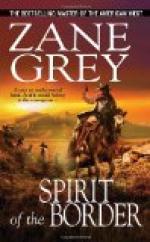Once beyond the aisles of waving corn the hunter saw over the shoulders of his captors the home of the redmen. A grassy plain, sloping gradually from the woody hill to a winding stream, was brightly beautiful with chestnut trees and long, well-formed lines of lodges. Many-hued blankets hung fluttering in the sun, and rising lazily were curling columns of blue smoke. The scene was picturesque and reposeful; the vivid hues suggesting the Indians love of color and ornament; the absence of life and stir, his languorous habit of sleeping away the hot noonday hours.
The loud whoops, however, changed the quiet encampment into a scene of animation. Children ran from the wigwams, maidens and braves dashed here and there, squaws awakened from their slumber, and many a doughty warrior rose from his rest in the shade. French fur traders came curiously from their lodges, and renegades hurriedly left their blankets, roused to instant action by the well-known summons.
The hunter, led down the lane toward the approaching crowd, presented a calm and fearless demeanor. When the Indians surrounded him one prolonged, furious yell rent the air, and then followed an extraordinary demonstration of fierce delight. The young brave’s staccato yell, the maiden’s scream, the old squaw’s screech, and the deep war-cry of the warriors intermingled in a fearful discordance.
Often had this hunter heard the name which the Indian called him; he had been there before, a prisoner; he had run the gauntlet down the lane; he had been bound to a stake in front of the lodge where his captors were now leading him. He knew the chief, Wingenund, sachem of the Delawares. Since that time, now five years ago, when Wingenund had tortured him, they had been bitterest foes.
If the hunter heard the hoarse cries, or the words hissed into his ears; if he saw the fiery glances of hatred, and sudden giving way to ungovernable rage, unusual to the Indian nature; if he felt in their fierce exultation the hopelessness of succor or mercy, he gave not the slightest sign.
“Atelang! Atelang! Atelang!” rang out the strange Indian name.
The French traders, like real savages, ran along with the procession, their feathers waving, their paint shining, their faces expressive of as much excitement as the Indians’ as they cried aloud in their native tongue:
“Le Vent de la Mort! Le Vent de la Mort! La Vent de la Mort!”
The hunter, while yet some paces distant, saw the lofty figure of the chieftain standing in front of his principal men. Well he knew them all. There were the crafty Pipe, and his savage comrade, the Half King; there was Shingiss, who wore on his forehead a scar—the mark of the hunter’s bullet; there were Kotoxen, the Lynx, and Misseppa, the Source, and Winstonah, the War-cloud, chiefs of sagacity and renown. Three renegades completed the circle; and these three traitors represented a power which had for ten years left an awful, bloody trail over the country. Simon Girty, the so-called White Indian, with his keen, authoritative face turned expectantly; Elliott, the Tory deserter, from Fort Pitt, a wiry, spider-like little man; and last, the gaunt and gaudily arrayed form of the demon of the frontier—Jim Girty.




